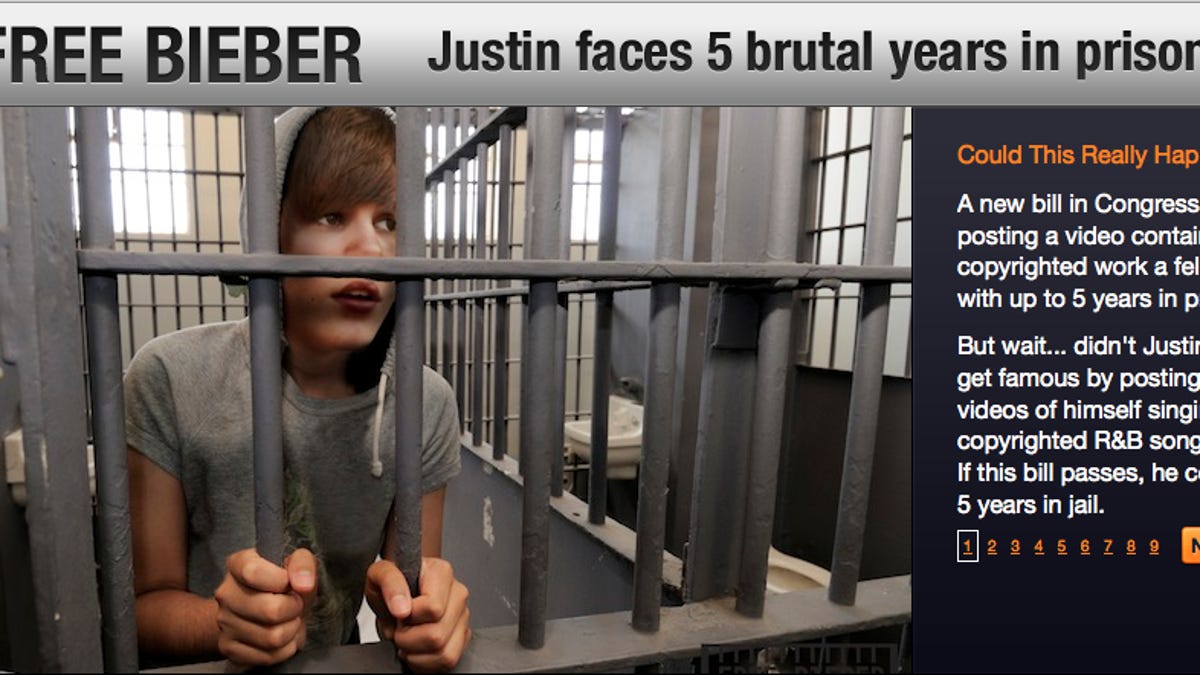Copyright bill controversy grows as rhetoric sharpens
Proponents and detractors of the Stop Online Piracy Act enlist new allies, while pop icon Justin Bieber suggests a U.S. senator "needs to be locked up."
Controversy over a new copyright bill continues to grow in Washington, D.C., with both proponents and detractors signing up new allies and sharpening their rhetoric. Even pop icon Justin Bieber has made an appearance.
The Stop Online Piracy Act, or SOPA, introduced last week in the House of Representatives to the applause of lobbyists for Hollywood and other large content holders, is designed to make allegedly copyright-infringing Web sites, sometimes called "rogue" Web sites, virtually disappear from the Internet.
That goes too far and hinders freedom of speech and innovation, the Consumer Electronics Association, NetCoalition, and the Computer and Communications Industry Association trade groups said in a letter sent today (PDF) to House members. SOPA could "constrain economic growth and threaten a vital sector of the U.S. economy and a major source of global competitiveness," it warned.
Content owners responded a few hours later by publicizing a pair of letters of their own from the National Fraternal Order of Police and the International Association of Fire Fighters. The firefighters' letter was actually written in September and was endorsing a similar-but-not-quite-the-same Senate bill, but its message was unmistakable: "Legislation targeting these foreign rogue Web sites will encourage Internet users to find legitimate sources for goods and content (and) will ensure that counterfeiters and pirates can no longer profit from this clearly illegal activity."
SOPA is so controversial--the Electronic Frontier Foundation calls it "disastrous"--because it would force changes to the Domain Name System and effectively create a blacklist of Internet domains suspected of intellectual property violations. Critics are, however, outgunned: SOPA's backers include the Republican or Democratic heads of all the relevant House and Senate committees, and groups as unlikely as the Teamsters have embraced it on the theory that it will protect U.S. jobs.
The back-and-forth between large copyright holders and their political adversaries has spilled over, as you might guess, onto their blogs.
Steve Tepp, an intellectual property lawyer for the U.S. Chamber of Commerce, wrote a snarky blog post on Friday accusing opponents of SOPA of engaging in "scare tactics." He said:
First up is Demand Progress. Before they even saw the House bill, they started calling it the "New Internet Blacklist Bill." Blacklist? That sounds pretty bad. But before we get carried away, let's take a look at the actual language of the actual legislation. Can YOU find a blacklist? No? Can you find a list of ANY kind? No?
Oooh, oooh, wait. There's a study! The bill requires a report to Congress about "notorious foreign infringers!" Wow. So, the only thing Demand Progress can hang its hat on is a study and a report to Congress. The fact is that the ONLY way that the Stop Online Piracy Act requires action against rogue sites is through a federal court process, applying the same rules of notice and procedure as any other case. The same is true for the Senate bill, the PROTECT IP Act.
The progressive activists at Demand Progress could, reasonably, be viewed as the U.S. Chamber of Commerce's natural enemy on most technological topics. Its founder, Aaron Swartz, was arrested in Boston in July on charges of illegally downloading (his backers might call it "liberating") millions of copyrighted documents; by then, the Motion Picture Association of America had already claimed that Demand Progress was allied "with at least one--and who knows how many more--offshore rogue Web sites that promote the theft and illegal marketing of American products like movies, video games and software."
David Moon, Demand Progress' program director, told CNET today that the Chamber's attack on his organization is a sign that an online anti-SOPA campaign is working.
"The proponents are panicking," Moon said. "I think this is a clear sign that we're giving lawmakers some nervousness and hesitation about putting their names on this bill."
He added: "I think a lot of the legislators were under the impression that this was not going to be a controversial bill and that it would slide under the radar...As we built a case, I think they've started to get more nervous about it."
Tepp, the chamber lawyer, did not respond to a request for comment from CNET. Neither did the chamber's public relations office.
And then, of course, there's Justin Bieber.
Bieber was making the rounds of radio shows last week to promote his forthcoming Christmas record, He tweeted that he was up at "5:30 this morning to do radio phoners and now off to do interviews"--when a host on a Washington, D.C.-area radio station asked him about proposed restrictions on streaming unlicensed content.
Some of the finer points were lost in the interview, including what bill was being talked about, and what it would actually criminalize.
But Bieber did say, referring to Sen. Amy Klobuchar (D-Minn.), who sponsored the Senate version: "Whomever she is she needs to know that I'm saying she needs to be locked up, put away in cuffs...I just think that's ridiculous."
That will surely please the fans who launched the thoughtfully-illustrated FreeBieber.org Web site, which warns that "Justin faces 5 brutal years in prison" thanks to proposed copyright law changes.


